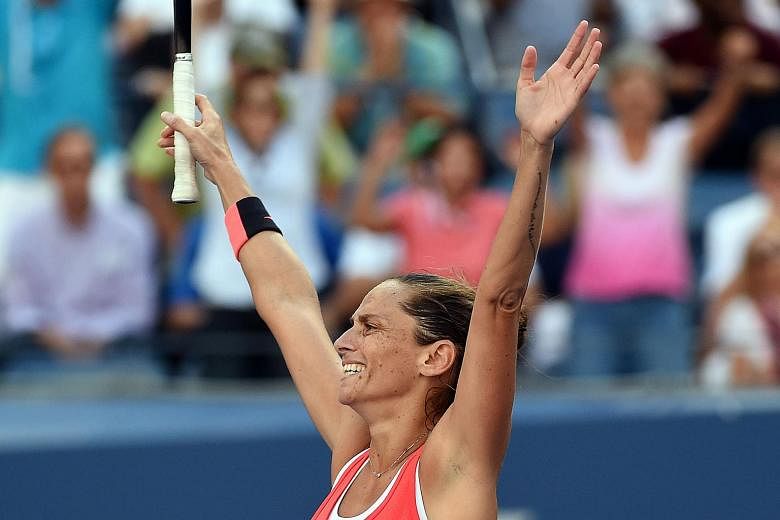An unheralded Italian has now put her own contemporary twist on the classic Latin phrase "Veni, vidi, vici", or "I came, I saw, I conquered", that is attributed to Julius Caesar after his decisive victory in the Battle of Zela.
Fast-forward about 2,060 years and another Italian conqueror, unseeded Roberta Vinci, 33, has made it a case of "Veni, vidi, Vinci" in New York, upsetting Serena Williams in three sets in the US Open semi-final that most expected would be a cakewalk for the American.
If the Vinci code baffled you, you're not alone. It baffled me too. Even Chris Evert, former world No. 1 and winner of 18 Grand Slam singles titles and just about as adept a judge of tennis talent, got it wrong. So wrong.
"I think this is the end of the road for Roberta Vinci," said Evert on ESPN before the match.
With the possible exception of Vinci's family and her coach, the rest of the world had assumed that the fringe singles player, despite her undoubted doubles pedigree, would be trounced in straight sets, collect her cheque and ponder her next move while Williams secured her niche in history.
So here's the question. Is there anyone who actually predicted that the unfancied Italian would be in the US Open women's singles final?
Even Williams seemed to underplay the contest before a ball had been hit. "She's going to present a completely different game than my last three matches, four matches," she said. "She has nothing to lose. I don't, either. So we're just going to go out and have a lot of fun."
Ultimately, the fun was all Vinci's. And the wider significance of the result was not merely about just the match, nor the fact that it placed two Italians in a Major singles final for the first time in the Open era, but also its overall impact in the wider context of the game.
Gone was Williams' shot at a calendar-year Grand Slam, gone too her chance to draw level with Steffi Graf as the winner of more Major singles titles - 22 - than anyone else.
For those reasons, Vinci's victory must rank as one of the most significant in women's tennis history.
The second US Open semi-final in New York, an unforeseen 2-6, 6-4, 6-4 victory to the rank outsider, was akin to an improbably scripted and scarcely credible Transformers battle, with the colossus of the women's circuit gradually dismantled against all odds by the woman considered least likely to trouble her on the final straight at Flushing Meadows.
Did Vinci, the same age as Williams, outmuscle her opponent? No. Did she out-slug her? No. Did she, perchance, out-serve her? No, no, not by a long chalk. But her relentless spirit, fitness, court coverage and her constant use of the shrewd and deft angles so characteristic of a doubles player catalysed an inexplicable mid-match loss of rhythm by the American.
Against an opponent playing in her first Major semi-final, and whose entire career prize money pales in significance when compared with Williams' 2015 earnings alone, the American fell at the very threshold of history, when least expected.
Williams' control of the semi-final was whittled away by degrees, rather than a dramatic reversal of fortune. The number of unforced errors by the American rose from just eight in the first set to 13 in the second. But as the momentum gradually ebbed away from Williams, it was her footwork that actually proved her undoing.
Once, twice, three times, she seemed to be a step behind her normal pace when hitting her returns, meaning that she was unable to marshal the precise movement and court coverage that traditionally anchor her shot-making on both flanks.
Consider the pressure on Vinci, the unseeded Italian, at the start of the fourth game of the second set. The unfancied challenger had been blown off court 2-6 in the first and was now down 1-2 - albeit still on serve - against Williams.
The American had just clinched a strong service game to reiterate the fact that her serve, often at 190kmh or faster, is the most potent weapon in the annals of women's tennis. And precisely at that point, when the Italian should have been buried in the avalanche of power on the opposite end of the court, she prised open successive chinks in the Williams armoury.
In previous meetings, Vinci, whose highest singles world ranking of 11 was achieved two years ago, had never taken a set off Williams and had won only a total of 21 games against the American. Furthermore, she had only twice progressed beyond the fourth round of a Major singles draw.
Body language, in tight matches, is always an interesting indicator of spirit. At one set all and 2-2, 15-all in the third set, the score was notionally on an even keel. But more importantly, it seemed that Williams had stanched the flow of errors and could be regaining control of the match.
The defending champion's roar of "Come on", her fist pump, her bent-double celebration of a hard-won point heralding the possible rediscovery of rhythm was a vocal avowal of the belief that perhaps, finally, she was starting to shut out her dogged opponent.
But on the other side of the net, there were no histrionics. Vinci, waiting to commence the next point, merely raised her eyebrows and permitted herself the briefest flicker of a smile.
Even a few minutes later, it seemed that Williams had finally wrested back control of the match. She served for the seventh game at 3-3, 40-30 but what ensued was a point that neatly encapsulated the match. During a long rally, Williams drew Vinci out of the court to run down a wide, short forehand and then fired what seemed to be a winner into mid-court.
By all logic, the shot should have eluded Vinci and Williams would have had a 4-3 lead. But the Italian scrambled back to retrieve a desperate backhand that seemed at least a metre or two out of her reach, put the ball back in play and then followed it up with a volleyed winner that brought the score back to deuce.
Then, having broken the formidable Williams serve, Vinci found herself on the ropes yet again, down two break points to the world No. 1. Improbably, she evaded the precipice as Williams' out-of-synch footwork once again contributed to her failure to drive home the advantage.
On the first break point, Williams covered ground to hit a scrambling forehand, but her balance was askew, in turn affecting her timing on the crosscourt shot. The ball went wide and the defending champion ended up marooned, doing the splits on the baseline. Finally, Williams hit wide on a cross-court return of serve as Vinci held both her nerve and her serve.
Later, looking back on that pivotal point in the match, Vinci said: "At the end when I made a break, 4-3, and served, I was a little bit scared. My arm was like (shaking). I'm not joking."
"But in my mind, I say, 'Don't think about this, because maybe you have more pressure. Stay calm, relax, and breathe during every single point. Don't think that you have Serena on the other side of the court'."
Now, as she prepares for the final she never dreamed she would be playing, perhaps it will strike her that there is a strangely unbalanced synchronicity that brackets her with Williams. When the American won her first Major singles title, the US Open, 17 years ago, Vinci was also making her own history, albeit on a lesser stage.
Also 17 years ago, Vinci won her first doubles Major, the French Open. Her partner then is still a close friend on tour. And they will face each other across the net in tomorrow's US Open singles final. Her name - Flavia Pennetta.


